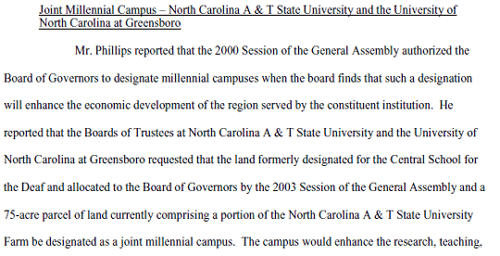| Southern Commission on Colleges
Association complicit with UNC Board of Governors white wash UNC Greensboro Nanoscience MS and PhD
degrees authorizations in order for UNCG to accept students
into UNCG's MS in Nanoscience program the next fall
05.06.21 |
| |
|
Praise the LORD and
nobody else! GOD's Will :Tip
of the spear Jesus, Michael J. Pippen, Sr.,
Wingmen Archangels Michael & Gabriel (eight
wings). Salvation
is who
have you help today other than yourself? |
| |
SUBSTANTIVE CHANGE FOR ACCREDITED INSTITUTIONS
OF THE COMMISSION ON COLLEGES |
Definition: Substantive change is a significant modification or
expansion of the nature and scope of an accredited institution.
Under federal regulations, substantive change includes:
|
- The addition of courses or
programs that represent a significant departure, either in
content or method of delivery, from those that were offered when
the institution was last evaluated
-
The establishment of an additional location geographically apart
from the main campus at which
the institution offers at least 50 percent of an educational
program.
Entering into a
collaborative academic arrangement such as a dual degree program
or a joint
degree program with another institution
|
|
April 8, 2010
Lea R. Williams wrote:
Lee,
Marcy
Stoll, our SACS representative, was on-campus this week for
the A&T SACS on-site reaffirmation visit (all went extremely
well) and discussed the 2008 JSNN substantive change
prospectus (attached), which was never formally submitted to
Belle Whelan’s office. Apparently, we faxed it from here to
Marcy for review and then forgot to follow up. Marcy
said that her office will fast track and monitor the
prospectus through SACS instead of having it in the queue in
the substantive change office, which could take weeks to
review, so that the UNCG plans to start the nanoscience
program in fall 2010 can proceed, emphasis added. |
|
(UNCG) Rebecca Adams to (SACS) Tom Benberg: Sarah Armstrong
Subject: Request for interpretation of accuracy of
nanoscience message, April 13, 2010:
The bottom line, however, is that we need to submit a full
prospectus and need to do so as soon as possible. This
request will be for approval to initiate a new off-campus
site (South Campus) and to initiate a new degree program (MS
in Nanoscience) at that site. Contrary to previous
interpretations, both represent substantive changes..
Due to the confusion, they are willing to waive the
requirement that we do so 6 months in advance and will usher
it though the approval process in a timely way so that we
can accept students into UNCG's MS in Nanoscience program
next fall.
|
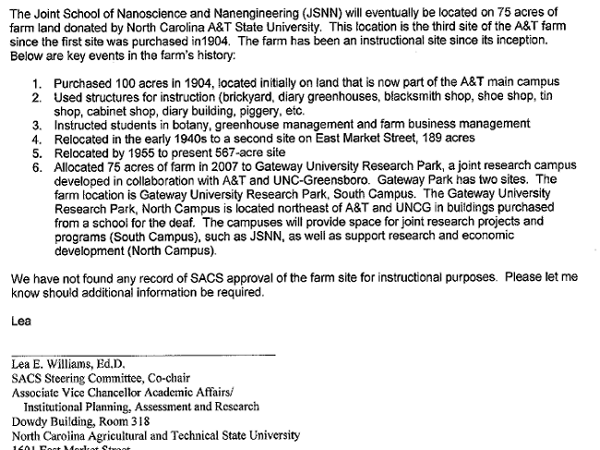 |
On Chancellor Martins watch, Lea Williams NCA&T Farm
history attachment submitted to the SACS item #6
allocation of 75 acres of farmland in 2007 to Gateway
University Research Park, extinguish claim 75 acres were
part of a joint Millennial campus is 2003. Millennial
Campuses are designated by UNC Board of Governors not
allocated by the universities.
NCA&T:
"As to the request to General Administration to approve
the ground lease, Ms. Fails cannot find any transmittal
letter, memo, etc." "
We wonder if possibly UNCG sent the request on behalf of
both universities.
General Administration should have whatever was sent to
request BOG action." General Counsel Office Of Legal
Affairs North Carolina Agricultural & Technical State
University, emphasis added.
In addition undocumented
75 acres of farmland alleged allocation contradicted
documents received from NCA&T attorney.
"We have not found any record of
SACS approval of the farm site for instructional
purposes." said alleged Lea Williams memo. |
|
|
|
| Department of Education
maintains a list of “DOE-recognized”
institution-wide accrediting agencies; for an
institution to be eligible to participate in
Title IV Financial Aid Programs, it must be
accredited by one of these DOE-recognized
agencies. Has also become the de facto arbiter
of eligibility for participating in federal
financial aid programs. |
| |
|
Accreditation is either:
|
- Institution-based (“institution-wide
accreditation”)
- Academic Discipline-based (“academic
program accreditation”)
|
UNC Board of Governors Policy Discussion
Accreditation, Dr. Suzanne Ortega, November 7,
2013. |
|
| |
| Alleged Dr. Alton Thomas
and David H. Perrin signed transmittal to Dr. Belle
Wheelan, President, COC dated May 24, 2010, your
letter dated December 16, 2009, you stated that UNCG
and NCA&T had demonstrated compliance with the
Commission’s Joint Curricular Ventures. This
Substantive Change Prospectus provides additional
information about the Joint School of Nanoscience and
Nanoengineering (JSNN) of North Carolina A&T State
University (NC A&T) and the University of North Carolina
at Greensboro (UNCG), as requested during the April 20,
2010 (10:00 a.m.) conference call with the SACS staff
(Drs. Sarah Armstrong, Tom Benberg and Marcy Stoll) and
the JSNN, NC A&T and UNCG contacts. These institutions
are respectfully seeking : |
| |
- approval for UNCG to
initiate the PhD and MS in Nanoscience on the South
Campus of Gateway University Park in fall 2010;
- a determination of
whether the MS and PhD in Nanoengineering will
represent a substantive change for NC A&T, and
- recognition of the
South Campus of Gateway University Park as a
non-contiguous part of both campuses rather than as
an off-campus site.
|
|
The
address where we hope to offer the MS and Ph.D. in
Nanoscience is:
|
South Campus, Gateway
University Research Park
2901 E. Lee Street
Greensboro, NC 27401-4904
|
|
The information included in the enclosed
full prospectus supplements the updated management
agreement sent to you on August 5, 2009. The
University of North Carolina Board of Governors approved
the establishment of the MS in Nanoscience on November
13, 2009, and the establishment of the Ph.D. program in
Nanoscience on January 8, 2010. ..we have informed UNC
General Administration that we are moving forward with
our plans to offer these programs in fall semester 2010
(classes commence on August 16). Approval to do so
from SACS Commission on Colleges is the last necessary
step in this process. |
|
|
|
|
Alleged, Dr. Belle
Wheelan SACS Commission on Colleges, letter dated June 25, 2010 to
Dr. Alton Thompson (NCA&T) and Dr. David H. Perrin (UNCG), thank
them for letter dated May 24, 2010 and prospectus for the M.S. and
Ph.D. degrees in nanoscience, a part of the curriculum sponsored by
the joint venture of the two institutions housed in the Joint School
of Nanoscience and Nanoengineering (JSNN) at two off-campus
instructional sites:
| South
Campus, Gateway University Research Park 2901 East Lee
Street Greensboro, NC 27401-4904 |
North
Campus, Gateway University Research Park 5900 Summit
Brown Summit, NC 27214 |
Nanotechnology
is the investigation fabrication and characterization of matter
structure at dimensions below 100 mm. and is, by its very nature
interdisciplinary.
A management agreement stipulated organizational
principles, approaches, and protocols has been formulated and
executed by the chancellors of the two partner institutions. JSNN
has two departments: The Department of Nanoscience at UNCG and the
Department of Nanoengineering at NCA&T. Nanoscience faculty and
staff will be UNCG employee and Nanoscience students will be UNCG
students. Nanoengineering faculty and staff will be NCA&T
employees. UNCG will award nanoscience degrees; NCA&T will award
the Nanoengineering degrees. The nanoscience programs will begin
August 16, 2010. The M.S. and Ph.D. degree programs in
nanoengineering will begin fall 2012.
Instructional
delivery will be traditional classroom delivery. The curriculum and
student learning outcomes for the M.S. and Ph.D. degree in
nanoscience appear appropriate with 33 hours required for the
master's degree and a minimum of 60 hours, a qualifying exam, and a
dissertation required for the Ph.D. degree.
"We approve the
M.S. and Ph.D. degree programs in Nanoscience, shall include them
within the scope of accreditation previously granted to the
University of North Carolina at Greensboro”
“We
also approve the two sites listed above as off-campus instructional
sites for the two institutions for offering 50% or more of a
program’s credits.”
Since
NC A&T offers approved master's degrees in Civil Engineering,
Chemistry, Biology, Industrial Systems & System Engineering,
Electrical Engineering, Mechanical Engineering, Computer Science,
Chemical Engineering, Physics, Computation Science and Engineering,
as well as doctoral degrees in Energy and Environmental Systems
Engineering, Computational Science and Engineering, Electrical
Engineering, Mechanical Engineering, and Industrial and Systems
Engineering, the proposed programs do not appear to be significant
departures from the approved curriculum of NC A&T. We accept the
notification for the programs and require no additional information
from you. |
|
|
|
SACSCOC Board of Trustees Publication- June 24, 2010 invalidate
Wheelan alleged letter approval of UNCG M.S. and Ph.D. degree
programs in Nanoscience; North and South Campus as instruction
sites for the two institutions for offering 50% or more of a
program’s credits. |
|
Duties of the Board of Trustees (c) It shall take final action on
the accreditation of applicant, candidate, and member institutions
and shall report to the College Delegate Assembly at its Annual
Business Session those institutions approved for accreditation and
those which have not been approved for accreditation. The final
action of the SACSCOC Board of Trustees shall be based on its
determination of an institution’s compliance with Commission
standards, policies, and procedures. The list of
collegiate institutions approved for accreditation shall be
published. [STANDING
RULES: SACSCOC BOARD OF TRUSTEES, EXECUTIVE COUNCIL] |
| |
 Commission
June 24, 2010 only approved substantive change was Eastfield
College, Mesquite, Tex. off-campus instructional sites at South
Garland High School and Lakeview Centennial High School. Commission
June 24, 2010 only approved substantive change was Eastfield
College, Mesquite, Tex. off-campus instructional sites at South
Garland High School and Lakeview Centennial High School.
Note:
SACSCOC Board of Trustees - December 6, 2010 Substantive
Change: Approved the Associate of Science in Nursing and the
Licensed Practical Nurse Keiser University, Ft. Lauderdale, Fla.
to Bauder College, Atlanta, Ga.
|
Tom Benberg to Rebecca Adams July 08, 2010:
The June 25th letter addressed to you was the first of two
letters written on that dated and it simply acknowledges your letter
of March 9th and confirms that a prospectus for the South Campus
instruction site is under review. Later that same day, the June 25th
letter to Drs. Thomas and Perrin was written following conclusion of
the prospectus review. In that letter we have approved: (a) the
South and North Campuses as instruction sites, and (b) the MS and
Ph.D. programs in Nanoscience for UNCG. Additionally, we indicated
that the proposed programs for NCA&T do not represent significant
departures from existing programming. Unambiguous alleged approval
of UNC Greensboro M.S. and Ph.D. degree programs and two sites
listed above as off-campus instructional sites weren’t SACS Board
of Trustees approval June 25, 2009. |
|
| |
|
No Collaborative
curriculum
agreement existed between NCA&T and UNCG
enabling UNCG to offer Nanoscience degrees. |
| Notwithstanding May
2007 UNC Board of Governors established
alleged Joint School of Nanoscience and
Nanoengineering, at bogus NC A&T / UNCG
Joint Millennial Campus, UNCG affiliate,
Gateway University Research Park,
Inc. to offer (a) joint
interdisciplinary Ph.D. degree and (a)
joint professional science master's
degree. |
 |
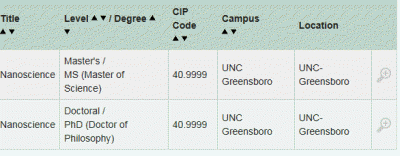 The
University of North Carolina
Board of Governors
authorized HWI UNC
Greensboro Nanoscience MS on
November 13, 2009 and PhD
program in Nanoscience on
January 8, 2010 requiring
UNCG students take relevant
courses at the School of
Engineering at North
Carolina A&T University and
be able to work on
collaborative projects with
faculty in the School of
Engineering”. The
University of North Carolina
Board of Governors
authorized HWI UNC
Greensboro Nanoscience MS on
November 13, 2009 and PhD
program in Nanoscience on
January 8, 2010 requiring
UNCG students take relevant
courses at the School of
Engineering at North
Carolina A&T University and
be able to work on
collaborative projects with
faculty in the School of
Engineering”. |
|
 |
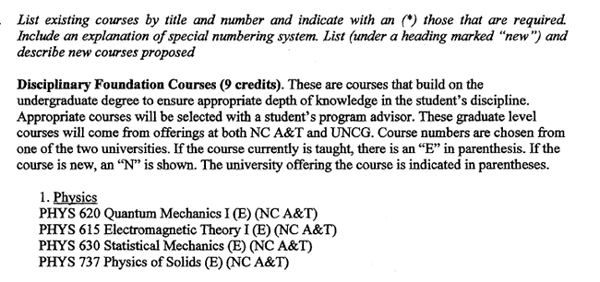 |
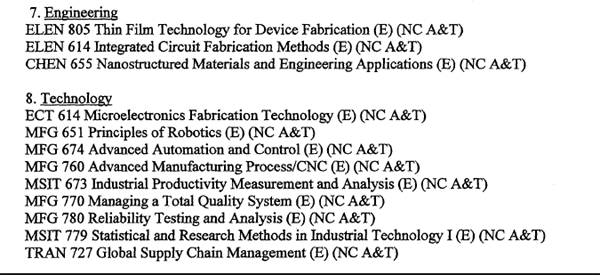 |
|
Excluding (The) North Carolina
Agricultural and Technical State
university from offering MS and PhD
Nanoscience degrees, forcing the HBCU
out of the JSNN Mission to offer (a)
joint interdisciplinary Ph.D. degree and
(a) joint professional science master's
degree. And depriving NC A&T benefit
Nanoscience funding. |
|
|
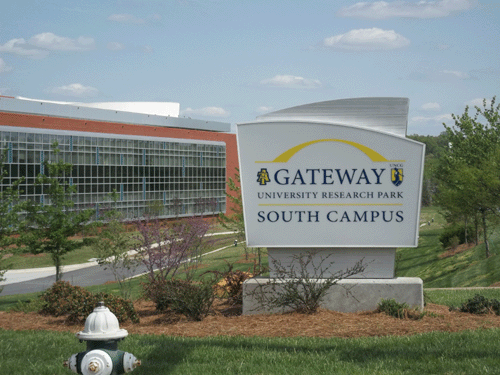 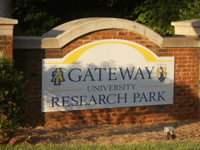 No
statuary NCGS:
116-198.34. (8b) NC A&T/
UNCG Joint
Millennial Campus was designated Oct.
10, 2003 enabling Greensboro Center for
Innovative Development, Inc.
to administer the
educational, research, and economic
development mission of a Joint
Millennial Campus. No
lawful leased was executed by Board of
Governors to the
Greensboro Center for Innovative
Developm No
statuary NCGS:
116-198.34. (8b) NC A&T/
UNCG Joint
Millennial Campus was designated Oct.
10, 2003 enabling Greensboro Center for
Innovative Development, Inc.
to administer the
educational, research, and economic
development mission of a Joint
Millennial Campus. No
lawful leased was executed by Board of
Governors to the
Greensboro Center for Innovative
Developm |
|
|
|
Proposed Lease was smoking Gun No
statuary NCGS:
116-198.34.(8b) NC
A&T/ UNCG Joint
Millennial Campus was designated Oct.
10, 2003 by
UNC Board of Governors for
Session Law 2003-284, Section 6.20, land
and facilities, and 75-acre parcel of NC
A&T Farmland. |
|
UNC
System General Administration is
not a constituent university in
the UNC System. Therefore the
Millennial Campus Statue does
not provide for the General
Administration to create an NC
G. S.: 116-198.34. (8b) Joint
Millennial Campus and UNC
Policy Manual 600.1.3 limits the
President to acquisition of Real
Property to $25,000 or less
without Board of Governors
approval and any proposal
involving the acquisition or
disposition by the institution
of any interest in real property
shall be recommended by the
Board of Trustees. |
| |
 |
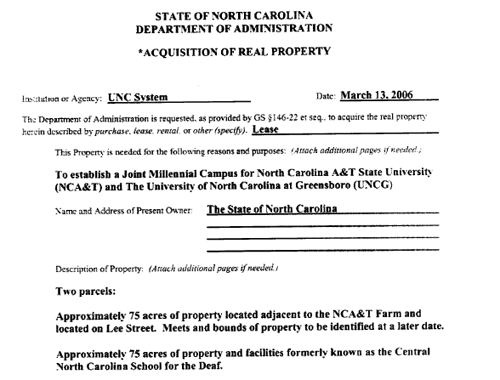 |
|
Erskine
Bowles UNC System
Acquisition of Real
Property by lease
P0-1 dated March 13,
2006 for the purpose
of establishing a
Joint Millennial
Campus for North
Carolina A&T |
|
|
State University and
The University of
North Carolina
Greensboro. Proposed
Lease unequivocal
extinguished UNC
Board of Governors
alleged Joint
Millennial Campus -
North Carolina A&T
State  University
and the University
of North Carolina
Greensboro - false
claim Oct. 10, 2003
designation of the
Central School of
the Deaf reallocated
to the Board of
Governors and
75-acre parcel on
NCA&T farmland as
Joint Millennial
Campus. University
and the University
of North Carolina
Greensboro - false
claim Oct. 10, 2003
designation of the
Central School of
the Deaf reallocated
to the Board of
Governors and
75-acre parcel on
NCA&T farmland as
Joint Millennial
Campus. |
|
|
  Unambiguous
No statuary NCGS:
116-198.34. (8b) NC A&T/
UNCG Joint
Millennial Campus was designated Oct.
2003 enabling Greensboro Center for
Innovative Development, Inc.
to administer the
educational, research, and economic
development mission of a Joint
Millennial Campus. No
lawful leased was executed by Board of
Governors to the Greensboro
Center for Innovative Development, Inc. for
Session Law 2003-284, Section 6.20, land
and facilities and 75-acre parcel of NC
A&T Farmland. link Unambiguous
No statuary NCGS:
116-198.34. (8b) NC A&T/
UNCG Joint
Millennial Campus was designated Oct.
2003 enabling Greensboro Center for
Innovative Development, Inc.
to administer the
educational, research, and economic
development mission of a Joint
Millennial Campus. No
lawful leased was executed by Board of
Governors to the Greensboro
Center for Innovative Development, Inc. for
Session Law 2003-284, Section 6.20, land
and facilities and 75-acre parcel of NC
A&T Farmland. link |
|
|
|
|
The National Center
for Educational Statistics (NCES) responsible
for collecting and presenting statistical data
and information for the nation; classifies
Nanoscience and Nanoengineering as
Nanotechnology CIP 15.1601: Engineering
technologies and Engineering related fields. |
|
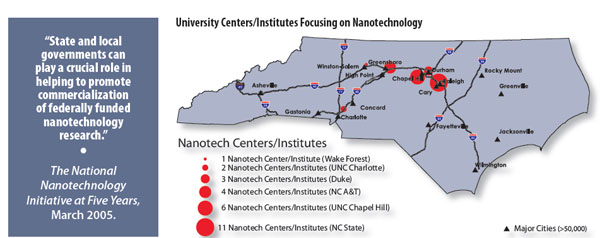
 Historical
Black Land Grant NC A&T was listed
as University focus on
Nanotechnology May 2005. Historical
Black Land Grant NC A&T was listed
as University focus on
Nanotechnology May 2005.
Cross town Historical
White UNC Greensboro was not listed
as a University focused on
Nanotechnology. |
 |
|
PCG/UNC-NCCCS/UNC Interim
report
3.doc/RB.SP.PC.CR.ATPCC.1/CC.14/10May05 |
|
|
Historical black North
Carolina A&T, as one of
the state's two land
grant institutions, has
programs through the
doctoral level. Its
programs include
engineering, arts and
sciences, agricultural
and environmental
sciences, business and
economics, education,
nursing, technology, and
graduates studies. “The
expected roles of a
land-grant institution,
is teaching agriculture
and engineering, and
providing cooperative
extension services” . |
| |
 |
|
For Liberal Arts UNC Greensboro with
doctorial programs in music and
nursing to offer Nanoscience
degrees requires access to NC A&T
academic programs and research:
“Although the degree is in
Nanoscience (does not include
Nanoengineering),

students will be given the
opportunity to take relevant courses
at the School of Engineering at
North Carolina A&T University and
must be able to work on
collaborative projects with faculty
in the School of Engineering. |
|
UNC Policy Interdisciplinary
Degree program:
An Interdisciplinary Degree program
involves two or more academic units,
either on the same or different
campuses, including non-UNC
campuses, in a formal agreement to
offer a program of study drawing on
two or more disciplines that will
result in a student being awarded an
interdisciplinary degree. If more
than one campus is involved in
offering the program it would also
be a joint degree, emphasis
added. |
|
Contractual Agreement –
typically is one in which an institution enters an agreement for
receipt of courses/programs or portions of courses or programs
(i.e., clinical training internships, etc.) delivered by another
institution or service provider. [SUBSTANTIVE CHANGE FOR SACSCOC
ACCREDITED INSTITUTIONS Policy Statement]. Therefore a Contractor,
institution or service provider enters into an agreement to
provide courses/programs or portions of courses or program |
|
| |
|
Voice and
email traffic with Sara
Armstrong, Commission
Substance Change Specialist
and participant in UNCG MS
and PhD Nanoscience
authorizations
determination; established
UNC-Greensboro M.S. and PhD.
Nanoscience authorization
were pursuant SACSCOC
COLLABORATIVE ACADEMIC
ARRANGEMENTS: POLICY AND
PROCEDURES as a dual
educational program with
NCA&T. |
|
|
|
A dual
educational program is one
whereby students study at
two or more institutions, and
each institution awards a
separate program completion
credential bearing only its
own name, seal and
signature. Emphasis added. |
|
|
|
|
|
Dr. Sara
Armstrong:
“The “program” is a cooperative
venture by which the two
institutions share
facilities, equipment and
other resources, called the
Joint School of Nanoscience
and Nanoengineering operated
by University of North
Carolina Greensboro (UNC-G)
and North Carolina
Agricultural and Technical
State University (NCATSU).
Four degrees are offered: |
|
|
|
-
At UNC-G: Master of
Science and Doctor of
Philosophy in
NanoScience (began Fall,
2010)
-
At NCATSU: Master of
Science and Doctor of
Philosophy in
Nanoengineering (to
begin Fall, 2012)
|
|
|
|
|
SACS COLLABORATIVE ACADEMIC
ARRANGEMENTS POLICY
Collaborative academic
arrangements are
agreements between
institutions purposes of
awarding academic credits
and/or educational program
completion credentials,
e.g., certificates,
diplomas, degrees or
transcripts. |
|
|
| |
Pursuant UNC Policy for
Interdisciplinary Degrees
if
a formal agreement to
offer Nanoscience degrees existed
between UNCG and NCA&T the
Nanoscience degrees would be joint.
|
Alleged, Dr. Belle
Wheelan SACS Commission on Colleges,
letter dated June 25, 2010 to Dr.
Alton Thompson (NCA&T) and Dr. David
H. Perrin (UNCG) said "Nanotechnology
is the investigation fabrication and
characterization of matter structure
at dimensions below 100 mm. and is,
by its very nature
interdisciplinary." UNCG
will award nanoscience degrees;
NCA&T will award the Nanoengineering
degrees."
|
| Unambiguous pursuant UNC
Policy a
curriculum
agreement to offer
Nanoscience Degrees between UNC
Greensboro and NC A&T does not exist
whereas if so Nanoscience
Degrees would be joint. |
|
|
|
B. |
|
Amended and restated JSNN
Management Agreement April 24, 2009 which explicitly
remove joint circular and student from JSNN Management
Agreement March 2008 Organization principle does not
constitute a contractual agreement between NCA&T and
UNCG for receipt of courses/programs or portions of
courses or programs (i.e., clinical training
internships, etc.). |
| |
|
Alleged Dr. Belle Wheelan, President,
SACS Commission on Colleges letter addressed
to UNCG David H. Perrin
and NCA&T Alton dated December 16, 2009:
|
Please pardon my delay in responding to
your letter of August 5, 2009, in
which you provided additional
information about the Joint school of
Nanoscience and Nanoengineering (JSNN)
being develop by A&T and UNCG. Instructional
delivery will be through classes and
research activities at A&T, UNCG, and
JSNN facilities. The
nanoengineering curriculum will be
governed by North Carolina A&T
University; nanoengineering degrees will
be awarded by North Carolina A&T
University. The nanoscience curriculum
will be governed by UNCG; nanoscience
degrees will be awarded by UNCG. Thank
you for including a copy of the amended
and restated Management agreement between
the two institutions, providing for the
governance and management of JSNN. The
demonstration of your compliance with
the Joint Curricular Ventures Policy is
acceptable. Emphasis added
|
|
|
Alleged, Dr. Belle Wheelan SACS Commission on Colleges,
letter dated June 25, 2010 to Dr. Alton Thompson (NCA&T)
and Dr. David H. Perrin (UNCG) said "A
management agreement stipulated organizational
principles, approaches, and protocols has been
formulated and executed by the chancellors of the two
partner institutions. JSNN has two departments: The
Department of Nanoscience at UNCG and the Department of
Nanoengineering at NCA&T. Nanoscience faculty and staff
will be UNCG employee and Nanoscience students will be
UNCG students. Nanoengineering faculty and staff will be
NCA&T employees. UNCG will award nanoscience degrees;
NCA&T will award the Nanoengineering degrees. " |
| |
|
Fraudulent claiming HBCU NC A&T and HWI UNCG
were partners in NCGS:
116-198.34. (8b) NC
A&T/UNCG Joint
Millennial Campus. May 2007 UNC Board of
Governors established alleged Joint School
of Nanoscience and Nanoengineering, at de
facto NC
A&T / UNCG Joint Millennial Campus, UNCG
affiliate, Gateway University |
|
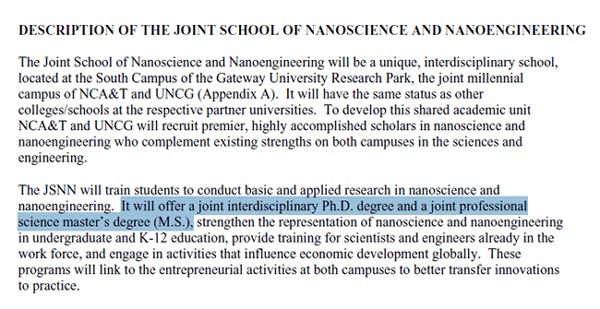 |
|
Research Park, Inc.; to offer (a) joint
interdisciplinary Ph.D. degree and (a) joint
professional science master's degree. |
|
| |
|
|
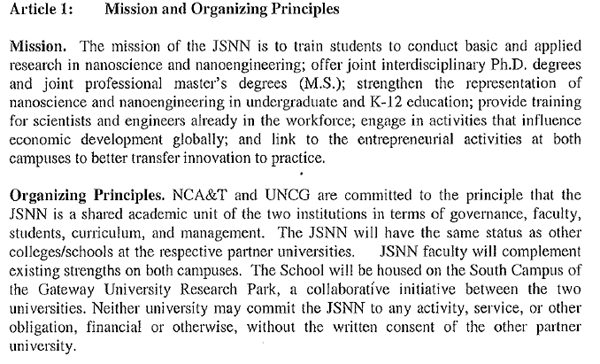 |
| JSNN Management Agreement March 3,
2008: Article 5. Degrees. Degrees
will be awarded jointly NCA&T and UNCG; Article
1: Mission and Organizing Principles.
NCA&T and UNCG are committed to the
principle that the JSNN is a shared academic
unit of the two institution in terms of
governance, faculty, students, curriculum,
and management; constitute Collaborative
academic arrangements are agreements between
institutions purposes of awarding academic
credits and/or educational program
completion credentials, e.g., certificates,
diplomas, degrees or transcripts. |
 |
|
 Harold
Martin, Rob Nelson, Alan Mabe,
email dated December 09, 2008, Subject Joint
Millennial Campus to: Provosts Perrin and
Thompson UNCG and NCA&TSU , attachment Second
Document Page 9 UNC GA/Questions from UNC
General Administration’s notes
the March 3, 2008 Memorandum (Management
Agreement) needs to be revised, updated and
reapproved. Harold
Martin, Rob Nelson, Alan Mabe,
email dated December 09, 2008, Subject Joint
Millennial Campus to: Provosts Perrin and
Thompson UNCG and NCA&TSU , attachment Second
Document Page 9 UNC GA/Questions from UNC
General Administration’s notes
the March 3, 2008 Memorandum (Management
Agreement) needs to be revised, updated and
reapproved. |
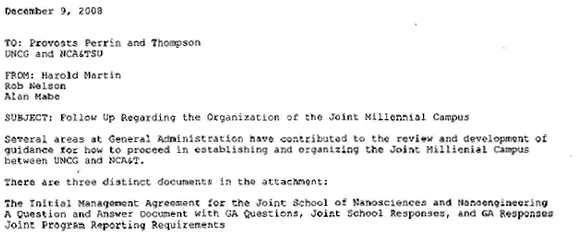 |
 |
|
|
Erskine Bowls UNC General Administration,
approved Amended
and Restated Management Agreement (April
2009) in part altered JSNN March 03, 206
Management Agreement Mission from offering
joint interdisciplinary Ph.D. degree and
joint professional science master's degrees;
to offering (stand-alone) interdisciplinary
Master of Science and Ph.D. degrees and a
Professional Master of Science in
Nanoscience degree. |
| |
|
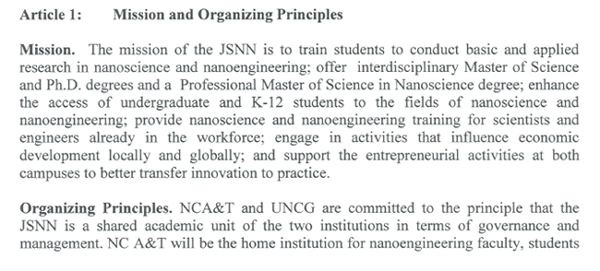 |
|
Organizing Principles. NCA&T
and UNCG are committed to the principle that
the JSNN is a shared academic unit of the
two institutions in terms of governance and
management -explicitly - removing shared
academic unit. UNCG
will be the home institution for nanoscience
faculty, students and the nanoscience
curriculum and degree programs. .NC A&T will
be the home institution for nanoengineering
faculty, students and the nanoengineering
curriculum and degree programs |
 |
|
|
|
|
|
Amended
and restated JSNN Management Agreement: Article 5
Degrees. Nanoengineering degrees will be awarded by NC
A&T. Nanoscience degrees will be awarded
UNCG. Organizing Principle. NCA&T and UNCG are committed
to the principle that the JSNN is a shared academic unit
of the institutions in terms of governance and
management, explicit removed curriculum from management
agreement ceasing to be a collaborative academic for
receipt of courses/programs or portions of courses or
programs between
NCA&T and UNCG,
without which no academic foundation for UNC Greensboro
to offer Engineering
technologies and Engineering related fields. |
|
| |
| UNC Greensboro could not provide 25% one-third or more or the credit
through UNCG direct instruction for Nanoscience PhD to comply with
SACS Policy on Institutional Names on an Academic Credential |
| If the student earns less than a majority and more than
one-third of the credits through instruction offered by SACSCOC
accredited institution, the Member institution must
submit documentation in accord
with the policy “Comprehensive
Standard 3.6.3: Documenting an
Alternative Approach.” The
institution’s documentation for
an Alternative Approach will
be forwarded to the SACSCOC
Board of Trustees for approval.
UNCG Ph.D. Nanoengineering
authorization did not follow and
Alternative Approach
Comprehensive Standard 3.6.3: |
| |
Doctor of Philosophy in Nanoscience
The PhD in Nanoscience requires a minimum of 60 hours
and is designed to prepare students to take positions in industrial,
governmental, or academic research settings by providing a solid
background in Nanoscience theory and experimental techniques through
course work and dissertation research.
The PhD program will include a core interdisciplinary
curriculum that provides a thorough background in the principles and
tools required for a research career in Nanoscience. Program will
include a core interdisciplinary curriculum that provides a thorough
background in the principles and tools required for a research
career in Nanoscience. Student's will take additional elective
course related to their research and professional interests.
Admission to the program will required and undergraduate or maser's
degree in an appropriate science or engineering disciplined as well
as acceptable test scores.
|
|
The National Center for Educational
Statistics (NCES) responsible for collecting and presenting
statistical data and information for the nation; classifies
Nanoscience and Nanoengineering as Nanotechnology CIP 15.1601:
Engineering technologies and Engineering related fields. |
 |
|
PCG/UNC-NCCCS/UNC Interim report
3.doc/RB.SP.PC.CR.ATPCC.1/CC.14/10May0 |
|
|
 |
|
Erskine Bowles UNC
General Administration categorizing Nanoscience Ph.D. as a
Physical Science; examining UNC Greensboro curricula for
similar Physical Science Ph.D. programs
determined: |
 |
UNC
Greensboro offer no similar Ph.D.
programs.
|
| |
|
Clearly UNC
Board of Governors and UNC General
Administration exploited HBCU NC A&T
Engineering circular and research to
establish Nanoscience MS and Ph.D. at
cross-town white UNC Greensboro. |
|
|
|
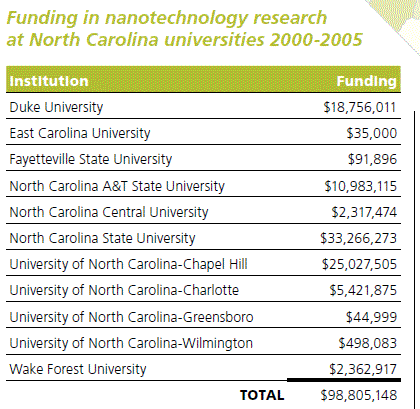 ”The
addition of a doctoral program is not an easy or simple extension of
the master’s program. Unlike most master’s programs, a doctoral
program is research-based. While doctoral program requirements
routinely include additional course work, the central program
requirement is the dissertation. The topic for the dissertation
normally derives from discussion with faculty who are engaged in
research and therefore knowledgeable about the “frontier of
knowledge” in the discipline. For a faculty member to then
properly guide and assist the student’s dissertation research, that
faculty member must be an active researcher. Hence, the
implementation of a doctoral program must be preceded by the
assembling of faculty who are conducting publishable research in
that discipline. UNIVERSITY
OF NORTH CAROLINA PROGRAM DUPLICATION STUDY Submitted by James H.
Woodward November 1, 2011 p12] ”The
addition of a doctoral program is not an easy or simple extension of
the master’s program. Unlike most master’s programs, a doctoral
program is research-based. While doctoral program requirements
routinely include additional course work, the central program
requirement is the dissertation. The topic for the dissertation
normally derives from discussion with faculty who are engaged in
research and therefore knowledgeable about the “frontier of
knowledge” in the discipline. For a faculty member to then
properly guide and assist the student’s dissertation research, that
faculty member must be an active researcher. Hence, the
implementation of a doctoral program must be preceded by the
assembling of faculty who are conducting publishable research in
that discipline. UNIVERSITY
OF NORTH CAROLINA PROGRAM DUPLICATION STUDY Submitted by James H.
Woodward November 1, 2011 p12]
NCA&T was 4th in Funding in Nanotechnology Research
at North Carolina Universities with $11 Million Dollars between
2000-2005. UNC at Greensboro 10th among the 11 institutions
conducted $45,000 dollars of Nanotechnology research between 2000
thru 2005. |
| |
 ”The
addition of a doctoral program is not an easy or simple extension of
the master’s program. Unlike most master’s programs, a doctoral
program is research-based. While doctoral program requirements
routinely include additional course work, the central program
requirement is the dissertation. The topic for the dissertation
normally derives from discussion with faculty who are engaged in
research and therefore knowledgeable about the “frontier of
knowledge” in the discipline. For a faculty member to then
properly guide and assist the student’s dissertation research, that
faculty member must be an active researcher. Hence, the
implementation of a doctoral program must be preceded by the
assembling of faculty who are conducting publishable research in
that discipline. UNIVERSITY
OF NORTH CAROLINA PROGRAM DUPLICATION STUDY Submitted by James H.
Woodward November 1, 2011 p12]
”The
addition of a doctoral program is not an easy or simple extension of
the master’s program. Unlike most master’s programs, a doctoral
program is research-based. While doctoral program requirements
routinely include additional course work, the central program
requirement is the dissertation. The topic for the dissertation
normally derives from discussion with faculty who are engaged in
research and therefore knowledgeable about the “frontier of
knowledge” in the discipline. For a faculty member to then
properly guide and assist the student’s dissertation research, that
faculty member must be an active researcher. Hence, the
implementation of a doctoral program must be preceded by the
assembling of faculty who are conducting publishable research in
that discipline. UNIVERSITY
OF NORTH CAROLINA PROGRAM DUPLICATION STUDY Submitted by James H.
Woodward November 1, 2011 p12]
 Commission
June 24, 2010 only approved substantive change was Eastfield
College, Mesquite, Tex. off-campus instructional sites at South
Garland High School and Lakeview Centennial High School.
Commission
June 24, 2010 only approved substantive change was Eastfield
College, Mesquite, Tex. off-campus instructional sites at South
Garland High School and Lakeview Centennial High School.






 Published
as "the
Published
as "the 


